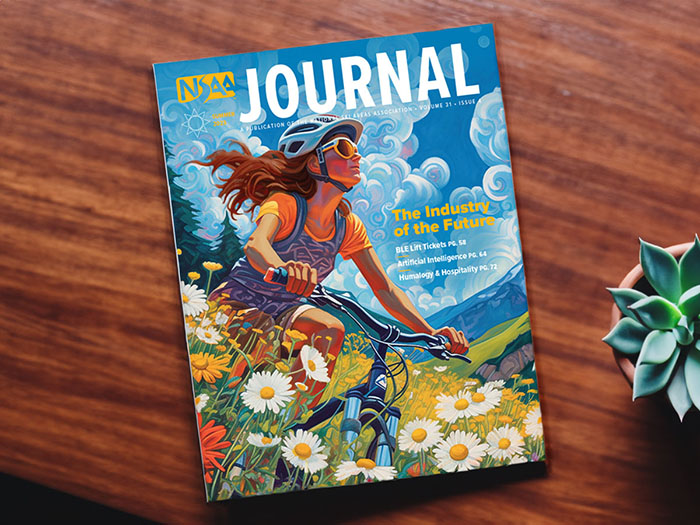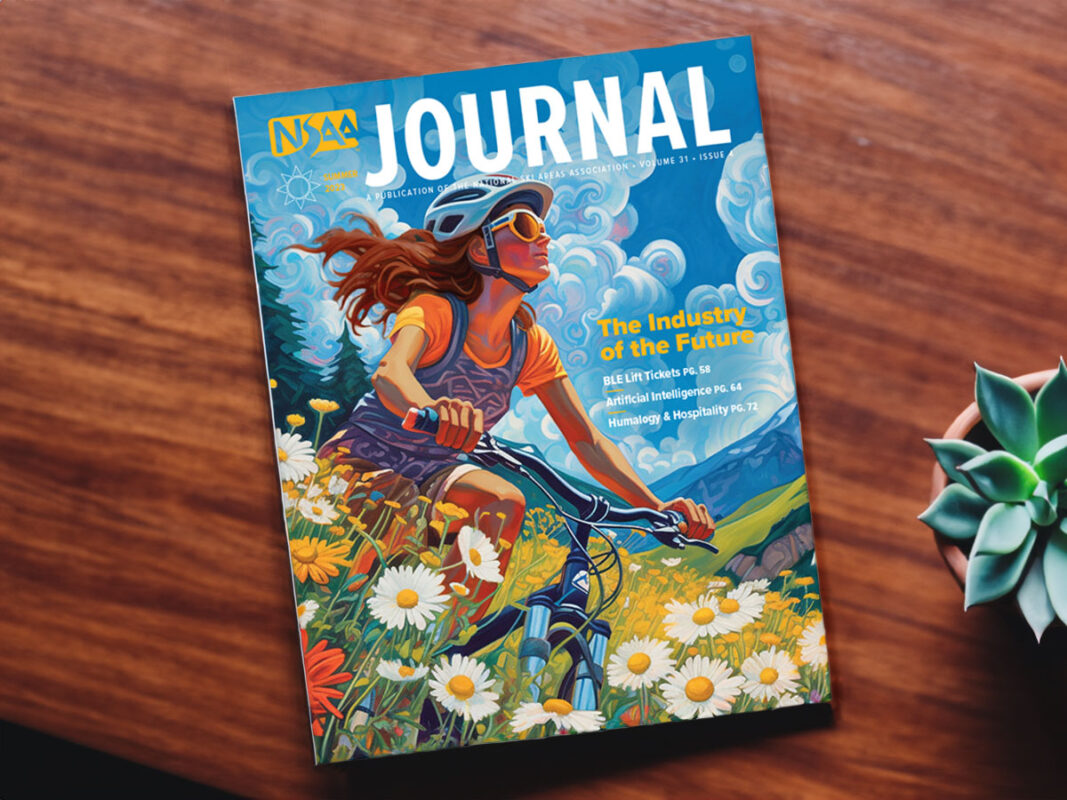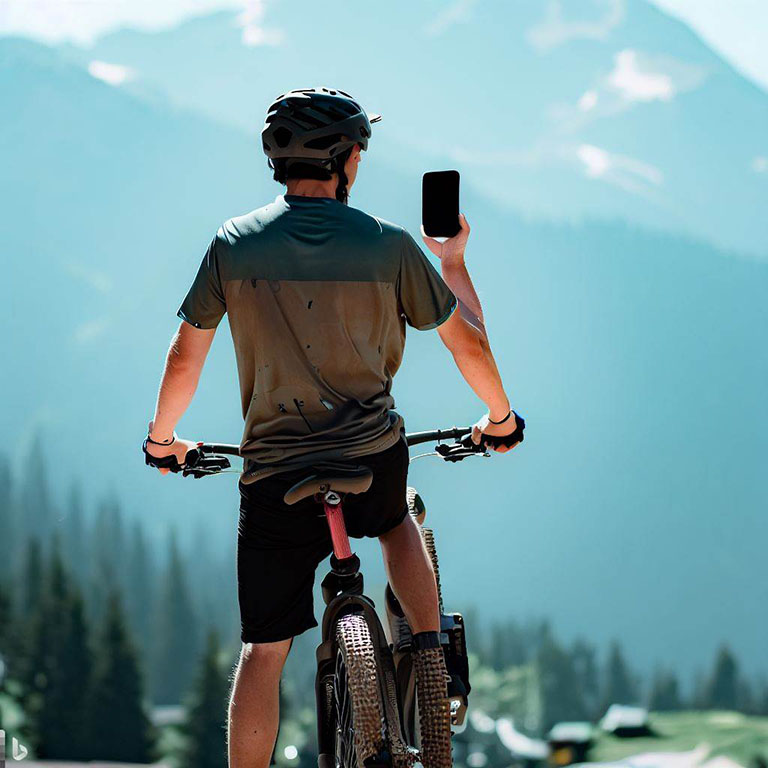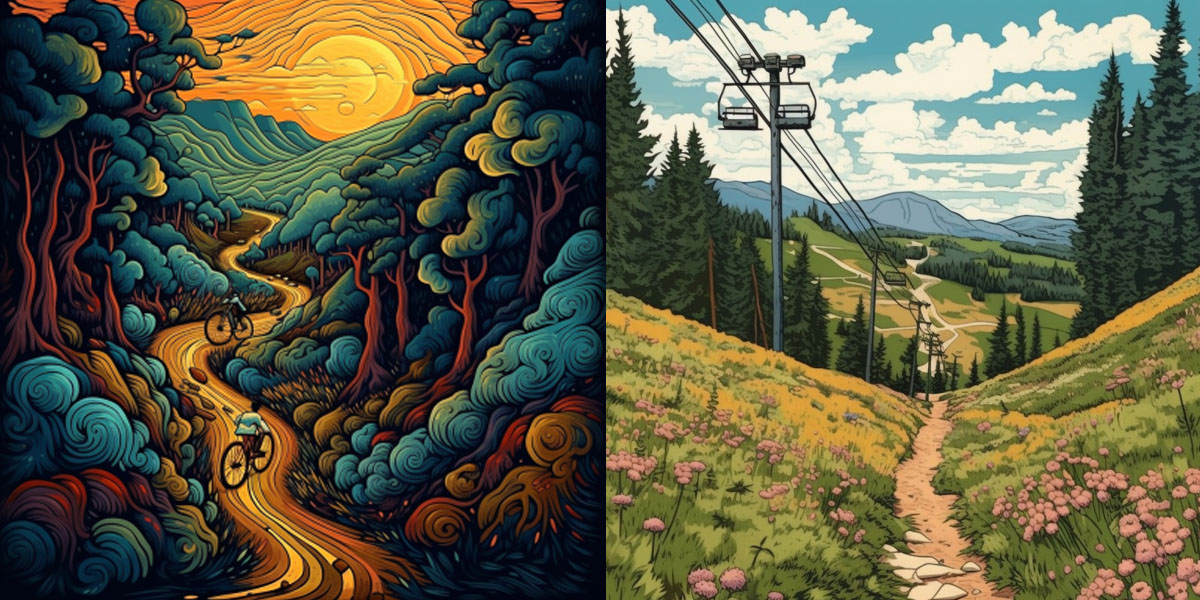
August 23, 2023 - Comments Off on Cover Story: An AI Challenge
Cover Story: An AI Challenge

Prompts and perseverance
A client called in June asking for help in creating an original illustration for a magazine cover. I’ve done this countless times in my career, but — for this project — talent sourcing and art direction was much different. The “talent” was AI.
For the Summer issue of the NSAA Journal, editor Heather Fried dipped her toe into the wild west of AI imaging software. Her challenge: to create a cover image to represent the issue’s editorial content. When she first shared her idea, I thought “brave,” but was quietly hoping not to get involved. I could see a warren of rabbit holes larger than Watership Down on the horizon.
Heather’s first attempts involved placing the desired items into the image with the prompt mountain biker in the summer accessing the lift through RFID gates with their phone, but the results were way off the mark. They were also comical in how anatomically incorrect they came out. “I had to throw in the towel on my original concept completely and go with something a lot more basic to get to an acceptable cover,” Heather explained. “This was a surprise realization because, before using AI, I really thought it could produce anything I could dream up on demand.” Frustrated, she shared her results after multiple attempts and a sizable time investment. We jumped on a Zoom call to discuss what to try next.

“Before using AI, I really thought it could produce anything I could dream up on demand.”
Enter Art Direction
With additional prompts taken from the art world — composition, color, style, perspective — the images instantly improved and soon she had a collection of real options: a dynamic profile portrait, a dreamy impressionistic painting, and a realistic alpine meadow — a few potentially cover worthy. She discovered one big hiccup in the process: “tweaking” is difficult. AI tends to start over in lieu of making isolated changes like a human illustrator would. Perhaps more practice with the software will yield more finesse. Or not.


“I am not a robot.”
While there’s much angst and discussion about artwork made with AI – such as what careers will be disrupted or replaced, who owns it, and the dangers of reality vs fantasy imagery and facts – I think we hold the key to reining it in. If we tap heavily into our humanity and take responsibility for molding AI, we can use skillful interactions — creative direction of the software — to make AI-assisted writings and artworks our own creations. Just as Heather experimented with visuals, her team also put AI writing to the test, producing a rote overview with the tone of an uninspired eighth grader. Clearly not the level of a seasoned editor. “If you keep tweaking/prompting what it spits out, you'll eventually get to something that is acceptable, in your voice, and accurate.” said Heather, adding “I could write volumes on this already, but the biggest takeaway so far has been: AI isn't coming for our jobs, it's people who are capable using AI that we need to worry about/work on eventually becoming ourselves.”
The NSAA cover image finally got there with the right prompts (art direction) and some retouching (a good eye) to get to an artistic, finished product. A masterpiece? No, but it fits the bill for a nonprofit budget and usage of two months on a trade magazine cover. Context matters. The novelty of an illustration on the Journal cover and the backstory of AI-generated artwork intrigued the members. “Though the cover was a compromise, it's also one that has generated a ton of great feedback — maybe the most praise in my four years with NSAA,” said Heather.
“AI isn't coming for our jobs, it's people who are capable using AI that we need to worry about.”
My Optimistic View
Because AI has no inherent talent of its own, individual humans (IH perhaps?) can use this tool, just like any other — software or paint brush — to execute their singular vision. Perhaps AI can open up a new world to those who see art in their mindseye, but lack the mobility to paint a canvas. Or help translate written works to enable sharing of more ideas across cultures. Which gets to the root question: Will you use your time, talent and AI for good or for evil?
Now, about copyright issues … how much time do you have?
Read about a recent ruling in federal court: AI cannot hold a copyright.
View an inspiring use of AI that gave a woman with paralysis her voice back.
_____
Share your experience and opinions of AI assisted creative works below. I’d love to start a conversation. (There may be a delay in your comment appearing to avoid the dreaded bots.)
Published by: Helen in EnSights, Publications
Tags: AI, AI imagery, AI-generated, art direction, artificial intelligence, brainstorming, Colorado, Denver, design, EnZed Design, graphic design, Helen Young, publication design




Comments are closed.